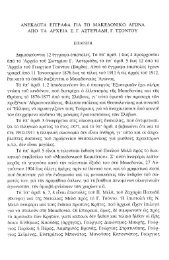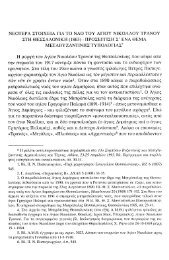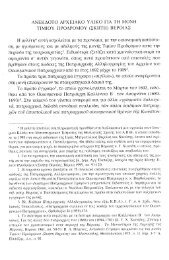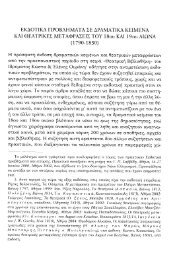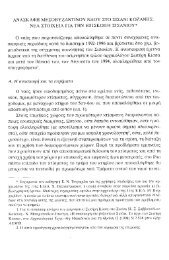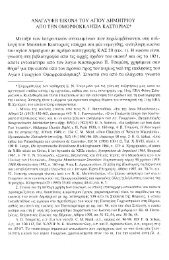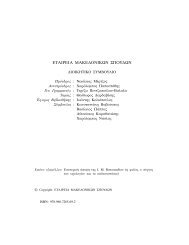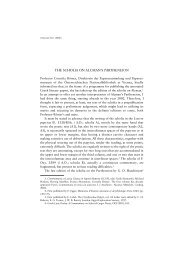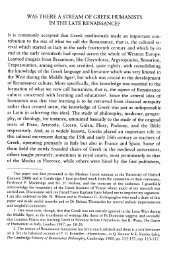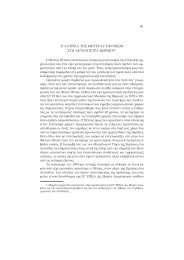GREEK EDUCATION IN MONASTIR - PELAGONIA
GREEK EDUCATION IN MONASTIR - PELAGONIA
GREEK EDUCATION IN MONASTIR - PELAGONIA
Create successful ePaper yourself
Turn your PDF publications into a flip-book with our unique Google optimized e-Paper software.
<strong>GREEK</strong> <strong>EDUCATION</strong> <strong>IN</strong> <strong>MONASTIR</strong> - <strong>PELAGONIA</strong> 15<br />
9. The painful conclusion to be drawn from the iniquitous incorporation<br />
of Monastir into Serbia in 1912 is that the root cause of the tragic outcome<br />
lay first and foremost in the lack of co-ordination of Greek military<br />
operations in the region and the impotence of Greek diplomacy in the Balkans.<br />
The weakness of Greece’s operational organisation became clear in<br />
the disagreement between Prime Minister Venizelos and Crown Prince<br />
Constantine concerning the order in which the cities and regions of Macedonia<br />
should be occupied. Venizelos’ insistence that the bulk of the troops<br />
in the field should be dispatched to secure Thessaloniki weakened the western<br />
front, which was Prince Constantine’s priority, with the result that Monastir<br />
was left undefended and empty of Greek forces, to be occupied, unopposed,<br />
by the astonished Serbs! As for Greek diplomatic efforts in the region,<br />
these came too late, and even then only under pressure of events that<br />
by that time were unfolding far too fast to be curbed or influenced.<br />
The people of Monastir could not understand how a city and a region<br />
“without a single Serb” – as the Serb troops who marched into Monastir<br />
admitted – could have fallen so painfully and ingloriously to alien forces,<br />
which moreover occupied the city “in the name of the Greek Army”! This<br />
question continues to torment the unfortunate survivors to this day…<br />
10. The sense of Greekness that continued to inhabit the people of<br />
Monastir and the surrounding area in their displacement and diaspora after<br />
1912 remains strong and powerful to this day. The entire history and presence<br />
of the associations created by the refugees from Monastir, their force<br />
and the focus of their interest, have always been concentrated on three main<br />
points: striving to reverse the fait accompli in the hope that Monastir may<br />
some day be united with Greece, working together for the benefit of all their<br />
members and to help them solve their problems of survival, and keeping the<br />
memory of their ancestral home fresh and strong. It should also be noted<br />
that neither distance nor the freedoms and opportunities open to those who<br />
emigrated to, for example, New York, could veil the memory of and the<br />
longing for the lost and far-away homeland, but on the contrary sustained<br />
and magnified their desire and determination to continue to lead their customary<br />
“Monastiriote way of life” and to pursue the just and indefeasible<br />
rights of a free Greek Monastir.<br />
11. In sum, the set of attitudes and values that characterised the people<br />
of Monastir was part of the common set of nationalist goals and visions<br />
shared by the Greek world as a whole. Its basic ideological media were<br />
Greek education, direct corporate militant struggle, organised self-sufficient



